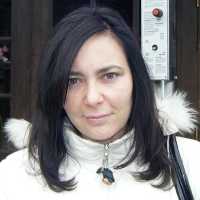
Kara C. Hoover
- Courses1
- Reviews2
- School: University of Alaska Fairbanks
- Campus:
- Department: Anthropology
- Email address: Join to see
- Phone: Join to see
-
Location:
Charles Bunnell Building 402A 1790 Tanana Loop
Fairbanks, AK 99775 - Dates at University of Alaska Fairbanks: April 2017 - October 2019
- Office Hours: Join to see
N/A
Would take again: No
For Credit: Yes
0
0
Not Mandatory
online
Awful
The class of Professor Hoover is very boring and she did not help with that. Her assignment instructions were usually quite unclear. And when you ask her to explain it, she tells you that it isn't her fault and to just listen to her lectures.
Biography
University of Alaska Fairbanks - Anthropology
I specialize in the evolutionary ecology of genetic variation within and among human populations and within the genus Homo. Adaptation to new or changing landscapes is a powerful microevolutionary force that I have explored throughout my career using approaches from population genetics, genetic epidemiology, and bioarchaeology. My particular interest is in the human sense of smell and the factors that shaped its evolutionary tuning as well as modern distribution of variation in human populations. I am also interested in links between smell and food preference/subsistence and evolutionary mismatches in modern environments. I coined the term 'sensory inequity' to describe the differential risk to olfaction seen in modern populations due to socio-economics and race--this ties into work on health inequities and environmental racism. My current projects are:
building ancient noses to learn what Neandertal and Denisova smelt
modern human variation in olfactory receptor genes
evolutionary mismatch between modern settings and the evolutionary ecology that tuned the sense of smell
sensory inequity and the health consequences of increased negative sensory burden
olfaction's role in food preference and diet
At UAF, I run the molecular anthropology lab which is equipped with standard PCR and real-time quantitative PCR. I also maintain a dedicated ancient DNA preparation lab which is PCR-free and equipped with biosafety cabinets.
I am affiliate faculty in the Molecular Chemistry and Molecular Biology Faculty, Honorary Research Fellow at Durham University, and a Research Fellow at the Research Institute for Sustainable Environments and Cultures. I was a Visiting Scientist in the Evolutionary Genetics Department at the Max Planck Institute for Evolutionary Anthropology Leipzig.
Expertise:
Biological Anthropology: bioarchaeology, anthropological genetics, evolution of human olfaction, dental anthropology, developmental stress
Resume
2005
Temple University
University of Alaska Fairbanks
As a teaching faculty at Temple University
I delivered courses at the undergraduate level. In addition to introductory anthropology courses
I taught courses in human genetics and bioarchaeology.
Temple University
2004
Emory University
During my one year as a Visiting Assistant Professor at Emory
I taught Introduction to Anthropology
Introduction to Archaeology
Human Adaptation
and Nutritional Anthropology.
Emory University
Assistant Professor of Anthropology
I engage in research on biological and genetic human adaptation through projects on hunter-gatherer resilience in prehistoric Japan and the evolution of human olfaction in Eurasia. I teach courses in bioarchaeology and anthropological genetics.
University of Alaska Fairbanks
University of Alaska Fairbanks
Fairbanks Alaska
I engage in research on biological and genetic human adaptation through projects on the evolution of human olfaction and hunter-gatherer resilience in prehistoric Japan. I teach courses in bioarchaeology and anthropological genetics.
Associate Professor
2002
Georgia State University
As a lecturer at GSU
my teaching load was 3 sections of Introduction to Anthropology each term. Plus
I taught one upper level/graduate course each term. Upper division courses included: Bioarchaeology
Diet Demography and Disease
and Human Variation. During the summer I taught Introduction to Cultural Anthropology.
Georgia State University
Max-Planck-Institute for Evolutionary Anthropology
I am currently working on a broad-scale analysis of evolutionary forces acting on the current distribution of human variation in olfactory receptor genes.
Visiting Researcher
Leipzig Area
Germany
1997
PhD
Biological Anthropology
1994
MA
Anthropology
1990
French
MA
Religion
1987
BA
Social Sciences/History
Alpha Chi
DNA
Higher Education
Evolution
PCR
Genetics
Grant Writing
Anthropology
Statistics
SPSS
Research
Teaching
Writing
Life Sciences
Science
Temporal variation and interaction between nutritional and developmental instability in prehistoric Japanese populations
Smell with Inspiration
Evolution of Olfactory Receptors
The scent of emotion
sex
and evolution
Exploring the relationship between hypoplasia and odontometric asymmetry in Isola Sacra
an Imperial Roman necropolis
Occupation Mediates Ecosystem Services with Human Well-Being
The geography of smell
Fluctuating Asymmetry as a Measure of Developmental Stress at the Mohr Site
Prospects and challenges for an archaeology of global climate change
Hoover
I am a biological anthropologist interest in the evolution of the human sense of smell. My current research is focused on genotype-phenotype associations and variation within and among human populations for food-related odors. I am also developing research in rural and urban differences in olfactory functioning and perception and how this relates to food culture. Finally
I am interested in how these findings may translate to intersectoral research and quality of life.\n\nKey words: olfactory receptor genetics
urban and rural variation in olfactory function
olfactory phenotype-genotype variation. Older interests in include bioarchaeology
Jomon Japanese prehistory and bioarchaeology
and genetic epidemiology\n\nWebpage and blog: www.smellofevolution.com
Kara C.
Hoover
Max-Planck-Institute for Evolutionary Anthropology
